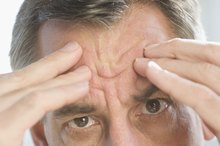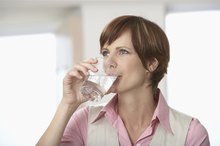Dehydration is often associated with feeling light-headed. Long periods in the heat and sun, especially after exercising, can leave a person feeling dizzy and in need of water. Sometimes feeling light-headed can be caused not by a lack of water, but by drinking water.
Significance
Water is crucial for health. Factors that increase the need for water include environment, exercise, illnesses and pregnancy. Lack of water, or dehydration, can cause many health risks aside from feeling faint and dizzy.
- Water is crucial for health.
- Factors that increase the need for water include environment, exercise, illnesses and pregnancy.
Potential
Causes of Low Sodium Levels in the Body
Learn More
While not common, it is possible to drink too much water. This can strain the kidneys as they attempt to rid the body of the liquid. Too much water in the body dilutes the sodium levels and dizziness and light-headedness can occur.
Warning
When a large amount of water is consumed in a short period of time, the brain may malfunction due to an electrolyte imbalance in the body's fluids. This is called water poisoning and feeling faint, dizzy, and nausea may occur.
Effects
How to Calculate How Much Water To Drink Daily
Learn More
According to St. Mary's Hospital nutritionist Tammy Fumusa, a person will most likely avoid feeling faint and dizzy from drinking too much water by simply going to the bathroom.
Runners
Runners need to drink water after they run, but too much water after a race can disturb electrolytes and put pressure on the heart. A Boston Marathon runner in 2008 died from a heart attack after drinking too much water too quickly.
Fact
Water is not toxic or poisonous but rapid and large amounts can be dangerous and disrupt sodium levels and electrolytes and tax the body's organs. A 2008 radio contestant died after drinking too much water without being able to use the restroom.
Related Articles
References
- Significance; Potential
- Ohashi Y, Sakai K, Hase H, Joki N. Dry weight targeting: The art and science of conventional hemodialysis. Semin Dial. 2018;31(6):551-556. doi:10.1111/sdi.12721
- Beverages, water, tap, drinking. FoodData Central. U.S. Department of Agriculture. Published April 1, 2019.
- Dietary reference intakes for water, potassium, sodium, chloride, and sulfate. National Academies Press, 2005.
- Jéquier E, Constant F. Water as an essential nutrient: The physiological basis of hydration. Eur J Clin Nutr. 2010;64(2):115-23. doi:10.1038/ejcn.2009.111
- Popkin BM, D'Anci KE, Rosenberg IH. Water, hydration, and health. Nutr Rev. 2010;68(8):439-4358. doi:10.1111/j.1753-4887.2010.00304.x
- Adan A. Cognitive performance and dehydration. J Am Coll Nutr. 2012;31(2):71-8. doi:10.1080/07315724.2012.10720011
- Dennis EA, Dengo AL, Comber DL, et al. Water consumption increases weight loss during a hypocaloric diet intervention in middle-aged and older adults. Obesity (Silver Spring). 2010;18(2):300-307. doi:10.1038/oby.2009.235
- National Institutes of Health Genetic and Rare Diseases Information Center. Aquagenic urticaria. Updated June 20, 2016.
- Centers for Disease Control and Prevention. Well testing. Updated April 10, 2009.
Writer Bio
This article was written by the CareerTrend team, copy edited and fact checked through a multi-point auditing system, in efforts to ensure our readers only receive the best information. To submit your questions or ideas, or to simply learn more about CareerTrend, contact us [here](http://careertrend.com/about-us).









